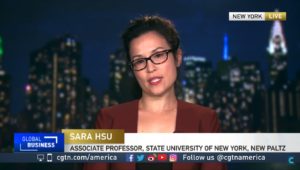
China’s financial authorities try to manage shadow banking, corporate leveraging and now also a heated trade war. Financial analyst Sara Hsu explains how the country’s banks are walking a scary tightrope, at the EastAsiaForum.
Sara Hsu:
Because of the banking sector’s close ties to the government, financial stability can and will be tightly controlled. Banks will likely be forced to lend to entities that would otherwise not receive extensive funding, such as local governments. Funds will be granted where the government desires at the expense of some of the riskier loans. We saw this happen time and again in the wake of the global financial crisis, as local governments followed orders to build infrastructure by creating bridges to nowhere and ghost cities.
This time around, waste may be less blatant but is unlikely to be eliminated. In the end, the central government will probably step in once again to convert the non-performing loans to municipal bonds or sweep them off banks’ balance sheets to asset management companies.
The trade war has exacerbated China’s dilemma of stimulating the economy to avoid slowing growth and tightening the economy to reduce financial risks. Although stability is likely to be maintained, the government walks an increasingly fine line to do so. If tensions worsen between the United States and China, it is possible that China may be forced to choose stability over growth — a choice that would shake the global economy by stunting global demand.
Sara Hsu is a speaker at the China Speakers Bureau. Do you need her at your meeting or conference? Do get in touch or fill in our speakers’ request form.
Are you looking for more financial experts at the China Speakers Bureau? Do check out this list.
